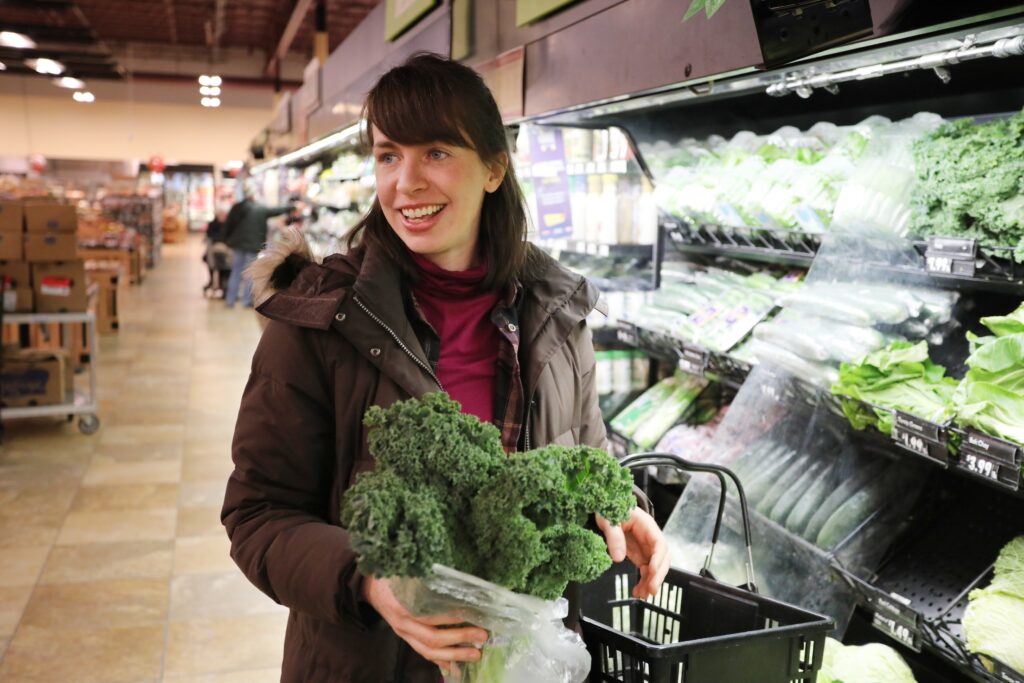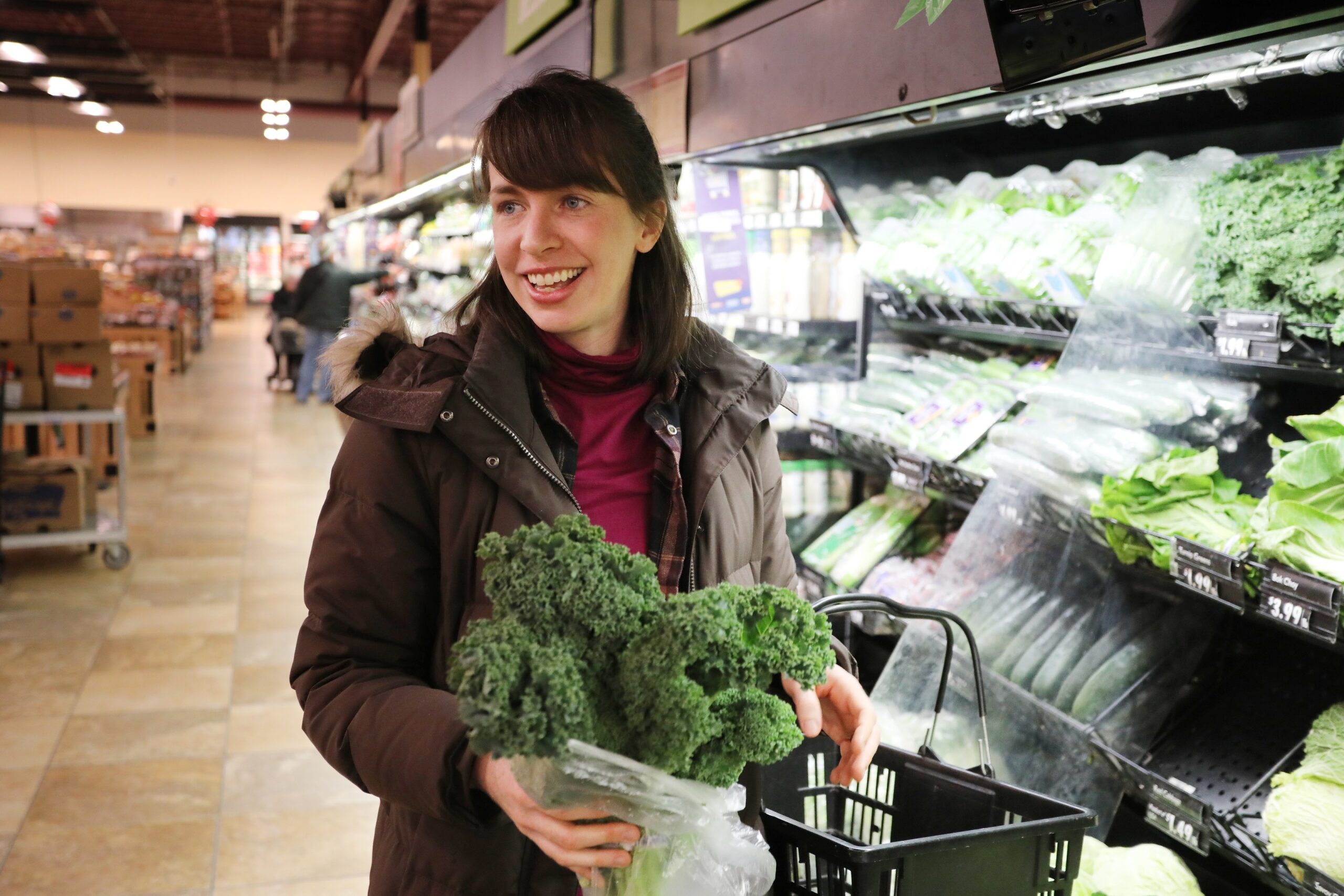
Everyone thinks like an economist about food. They just don’t necessarily know it, says Amelia Finaret, assistant professor of global health studies at Allegheny College.
The economics of nutrition is not just about how much consumers spend on certain types of food, she adds. “It’s a lot broader than people think. It’s not only about finances, although that certainly is one aspect. It also involves how people make decisions about allocating scarce resources such as time, energy and land.
“The economics of nutrition combines nutrition science with the social science of nutrition — how people make tough decisions about what they’re going to eat and when and how it affects their bodies,” says Finaret.
In 2019, Finaret published an article, “Beyond Calories: The New Economics of Nutrition,” in the Annual Review of Resource Economics with co-author William A. Masters, Ph.D., of the Friedman School of Nutrition Science and Policy and the Department of Economics at Tufts University. The article is a review of the scholarly literature that explores fundamental aspects of human well-being and sustainable development.

“The challenge is now to make a high-quality diet available to all,” says Allegheny College Professor Amelia Finaret. (Photos by Ed Mailliard)
The professors have gone through publicly available data and literature in nutrition economics to consider their implications for food policy around the world. “This is a new field,” says Finaret, “trying to help solve intractable nutrition problems in our world. There is plenty of food in the world. The issues, though, include quality of diet, avoiding contaminants and keeping the food supply safe from food-borne diseases. The challenge is now to make a high-quality diet available to all. Poor quality diets disproportionately affect the poor, particularly in Sub-Saharan Africa.”
One of the keys to improved nutrition for all will be loosening some of the constraints, including time and income, on individuals and families as they make choices about what they’re going to eat, says Finaret. There is “no one right way” to eat, she says, “because people’s preferences matter. People are doing the best they can given their circumstances. Economics is very non-judgmental. There has to be acknowledgment that there are many constraints on people’s eating decisions.”
The “Beyond Calories” article draws three main conclusions:
* Nutrition research can benefit from economic explanations of individual behavior and societal outcomes, just as economics research can benefit from nutrition science to understand the causes and consequences of dietary intake.
* That for most of history, food economics was concerned mainly with feeding people, given widespread hunger and poverty. That focus has now shifted to exploring how excess consumption is impacting health, leading to a rise in obesity and diet-related metabolic conditions, and what can be done to educate people about their diets and keeping agriculture and food production sustainable and safe.
* There is great potential for future collaboration among economists and nutritionists to make these improvements using new data and new methods to solve a wide range of diet-related problems around the world.
The factors that impact the way people make food choices are complicated and hard to measure, Finaret says.
Poor diet quality has long been the greatest avoidable cause of death and disability, first through infectious diseases, especially in childhood, and more recently with diets contributing to more adult issues with type 2 diabetes, high cholesterol and coronary artery disease, the article states. “A second set of concerns about human nutrition is environmental, given that food production is the largest single contributor to natural resource use, pollution and especially carbon emissions. Climate change and other environmental factors affect food supplies, through long-term trends and more frequent extremes such as droughts and floods,” according to the article.
How much or how little people know about their nutritional needs can affect how they eat, but other practical factors also figure in those decisions, says Finaret. For instance, people may choose more unhealthy foods because they simply taste better or are quicker to consume. Or the social groups we associate with may impact our food selections. Or a lack of time to prepare meals. Then there is always the giant hand of corporate food marketing stirring up dietary preferences.
The professors’ research shows that in the United States, “healthier dietary patterns have been estimated to cost approximately $1.50 per day more than less-healthy dietary patterns.”
Through all this, the economics of nutrition tries to be nonjudgmental, says Finaret. “People can and should do what they want; it just comes down to how best to loosen the constraints that people face in making food decisions,” she says.
Finaret’s simple advice for choosing the food you consume is to 1) enjoy eating so that the first bite and the last bite (whether it is the 50th or 100th bite) is pleasurable. In other words, when what you’re eating starts to lose some of its appealing taste, it’s time to put down the fork or close the bag of pretzels; 2) develop a routine so that you don’t have to make decisions all the time, such as weekly or monthly meal plans, optimizing your time available to shop and prepare meals, and how much money you’re able to spend at the grocery store; and 3) avoid extremes — “eat a diverse diet in line with your energy needs.”
Editor’s Note
This year, Finaret and Masters will be writing a textbook, “Food Economics: From Agriculture to Nutrition and Health.” The textbook will be accessible to anyone interested in understanding the economics of food, and understanding the book will not require previous training in economics. The book is geared in particular toward pre-health and pre-nutrition professionals, who would be able to incorporate economic thinking into their professional and research lives.


